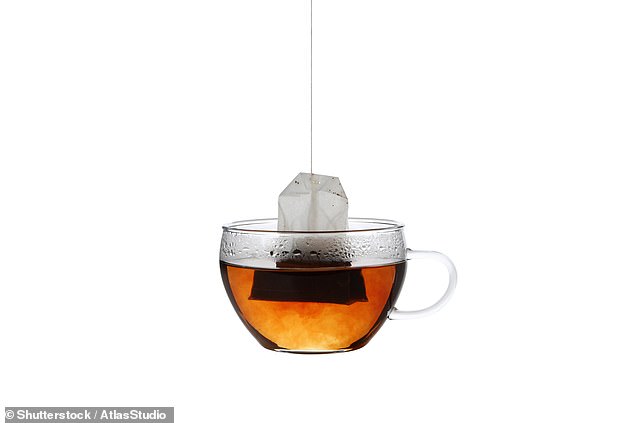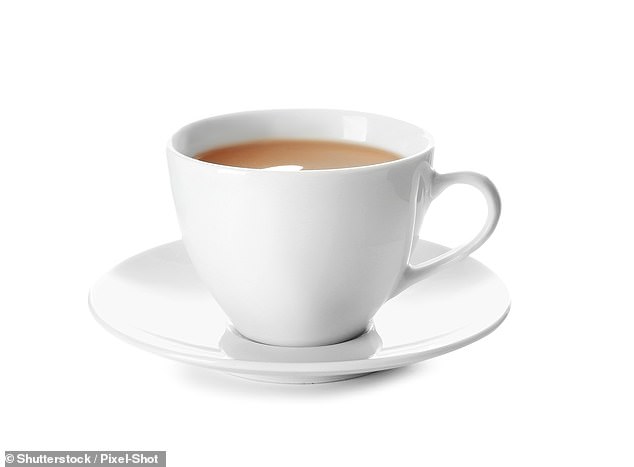A doctor has issued a major warning to tea drinkers – including anyone who drinks just one mug a day.
Physician and University of Ottawa graduate Mark Hyman took to Facebook to warn his followers that a single cup of the beverage could expose your body to ‘billions of microplastics’.
Microplastics are plastic fragments that measure less than 5mm in diameter and can be found in food, water supplies and even in the air.
Previous studies have implicated the miniscule fragments in the onset of diseases such as cancer, though long-term effects on human health remain unclear.
The medical expert’s post is likely to cause alarm after revealing that ingesting a brew made from one standard tea bag could release concerning amounts of microplastics into the human body.
He did however state that tea can be an incredible source of antioxidants, but advised users to get familiar with the research, which he gleaned from chemistry journal ACS Publications.
‘A recent study found that plastic tea bags release approximately 11.6 billion microplastics in a single cup of tea’, warned the doctor.
He seemingly suggested that exposure to such high amounts of microplastics was dependent on the ‘quality’ of the teabag, before sharing tips on how to reduce exposure to the fragments.

Doctor Mark Hyman has issued a major warning to tea drinkers – including anyone who drinks just one mug a day (stock image)
‘If you are a tea drinker, use an organic loose leaf tea and steep it’, penned Mark.
‘Using a stainless steel or glass strainer will reduce your microplastic exposure significantly’.
Of course there is the question of convenience, as those on the go may not have the time to prepare such an elegant cuppa.
‘If you like using tea bags for their convenience or portability, make sure you’re getting the kind that’s free from bisphenol-A (BPA), phthalates, polypropylene, and epichlorohydrin’ he continued.
‘Look for tea bags made from organic hemp, cotton, or plant fibers instead.
‘Tea can be an incredible source of antioxidants in your life, but just like food – quality matters’.
Previous studies have shown that food packaging is a major source of microplastics.
However, until now, there has been little research into the number of these plastics that we ingest from tea bags.

The medical expert said a single cup of tea could expose your body to ‘billions of microplastics’ (stock image)
In a new study published in Chemosphere, the team investigated the microplastics released from three popular teabag types, which can easily be purchased online or in local supermarkets.
The first type was a nylon teabag, which the researchers ordered from Amazon.
Next, a polypropylene teabag was ordered from AliExpress.
Finally, a third type was bought in a supermarket, but with an unknown filter polymer.
For each teabag type, the researchers transferred 300 teabags into a 1-litre beaker containing 600ml of water at 95°C.
The team found that, across all three types, huge amounts of nano-sized particles were released into the water.
The polypropylene teabags were the worst offenders, releasing approximately 1.2 billion particles per milliliter, with an average size of 136.7 nanometres.
Meanwhile, the nylon teabags released 8.18 million particles per milliliter, with an average size of 13.8.4 nanometres.
Humans can be exposed to plastic particles via consumption of food products, drinking water and via the air.
However, the level of human exposure, chronic toxic effect concentrations and underlying mechanisms by which microplastics elicit effects are still not well understood enough in order to make a full assessment of the risks to humans.

Previous studies have implicated microplastics in the onset of diseases such as cancer, though long-term effects on human health remain unclear (stock image)
Researchers are increasingly concerned about the capacity of such particles to be internalised within cells causing alterations in cellular function, particularly when interacting with organs in children and causing definitive alterations in adult life.
There is a growing body of evidence that plastics could play a key role in early-onset cancer genesis, where healthy cells turn cancerous.
Earlier this year, a study found cancer cells in the gut spread at an accelerated rate after contact with microplastics.
Experts have also raised the alarm about a potential between microplastics and reproductive health.
Scientists warned in June that they found tiny plastic particles in men’s sperm.
This plastic was specifically used in pipes in plumbing, with tests revealing that exposed sperm was less mobile, and therefore worse at fertilising eggs.
The Chinese team suggested this may link microplastics to an observed global decrease in fertility rates.
Elsewhere, research has revealed the staggering amounts of tea that Brits consume each morning before heading to work – a jaw-dropping 53 million.
A poll of 2,000 adults found 12 per cent have a brew as soon as they wake up in bed – and 10 per cent have up to three or more cups to kick off their day.
This all equals as much as 2,682 million gallons of the nation’s favourite drink – enough to fill four Olympic size swimming pools.
Over half (59 per cent) admit they can’t start the day properly until they’ve enjoyed their first mug, with 63 per cent rarely or never skipping the refreshing ritual from their morning routine.
Additionally, 64 per cent credit tea with making them more productive and 78 per cent say it provides them a little lift and morning boost, setting them up for the day.
In fact, 37 per cent will happily ditch checking the news to squeeze in a morning tea, while 35 per cent will sacrifice making their bed to have the hot drink if they are pressed for time.
Staggeringly, one in 10 will even forgo brushing their teeth just so they can start their day with a mug of tea.
The research, which was commissioned by PG Tips, also found 32 per cent are refreshed after their morning brew, and 28 per cent feel alert.
A quarter (26 per cent) rely on it for comfort, and as the day unfolds, 41 per cent use tea as a reset button, and say it helps them refocus before their next task or activity.
If tea drinkers don’t get their morning cuppa however, 27 per cent admit they feel flat, and 23 per cent say they are tired.







